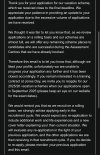I would think it depends on the size of the firm and in relation to its graduate recruitment, how many trainees the firm takes on. For example, a firm like
Debevoise & Plimpton takes on around 10 trainees. For a firm like this, I would imagine it’s less competitive to enter international arbitration than say
Freshfields, which recruits 90-100 trainees annually, all of whom might be super interested in international arbitration as a training contract seat and an area they’d like to qualify into.
I think for firms that are prioritising the growth of their transactional practices, this might also reduce the competition around international arbitration. For example, private equity is now increasingly popular and is a known strength of US firms. I imagine this is a very competitive area to enter and qualify into now compared to international arbitration. However, I don’t know for sure. 🤷🏾♂️
I think ultimately it would come down to luck, in that it depends on the interests of the trainees and NQ’s at the time. I imagine these vary every year. For example, one year competition law might be super popular and then the next year it isn’t, and instead intellectual property is the most competitive area to enter. I am very interested in dispute resolution, but I could start a TC or near becoming an NQ and decide I want to become a tax associate (very unlikely for me but never say never). 😂

